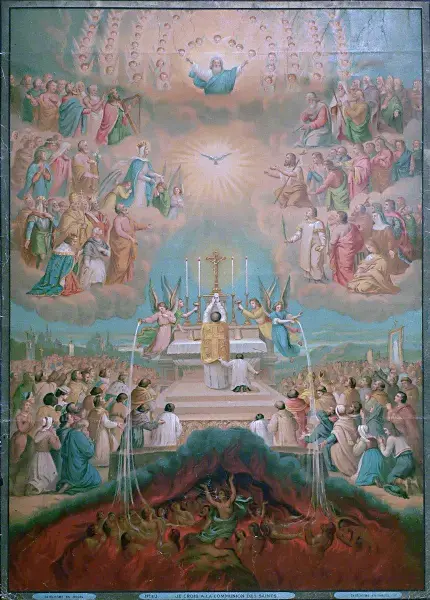The Saints in Heaven Hear Our Prayers
- fatheratchley
- Sep 29, 2023
- 4 min read

Why do we believe that the saints in heaven hear our prayers? Because the Bible tells us they do, as when the Book of Revelation describes how the 24 Elders fall down and worship God offering up “the prayers of the saints [on earth] as incense before the throne of God" (Rev. 5:8). These prayers are presented together “with the prayers of all God’s people, on the golden altar in front of the throne“ (Rev. 8:3). That the saints in heaven know of our struggles on earth and join their prayers of supplication with our own that we might join them is a core belief of Catholic Christianity.
Yet some contend that to ask for prayers from those in heaven is idolatry. How the prayers of the saints is not idolatry can be shown from passages in Scriptures that are often overlooked, like 1 Thes. 3:11-13 whereby we are exhorted to grow in holiness and love for one another, and 1 Tm 2:1-4, which has St. Paul begging us to pray for all people. These and other passages in the Bible indeed profess belief in a “communion of saints” whereby those in heaven pray that we the living (along with the dead) may join them.
Every year I look forward to re-reading a sermon by St. Bernard on this communion of saints. If you are not familiar with that text, I offer it here for your edification and delight. May God, the God of the living and not the dead (Mk 12:26-27), be pleased with our prayers for one another, as we seek to obtain Christ’s earnest desire that those who die believing in God rise to eternal life. This is the Christian faith to which Scriptures and Tradition attest. May the Lord bless you in that faith and in your own fervent prayers for the salvation of souls.
-- Fr. Jonathan Atchley
Sermon by Saint Bernard, Abbot
“Why should our praise and glorification, or even the celebration of this feast day mean anything to the saints? What do they care about earthly honors when their heavenly Father honors them by fulfilling the faithful promise of the Son? What does our commendation mean to them? The saints have no need of honor from us; neither does our devotion add the slightest thing to what is theirs. Clearly, if we venerate their memory, it serves us, not them. But I tell you, when I think of them, I feel myself inflamed by a tremendous yearning.
“Calling the saints to mind inspires, or rather arouses in us, above all else, a longing to enjoy their company, so desirable in itself. We long to share in the citizenship of heaven, to dwell with the spirits of the blessed, to join the assembly of patriarchs, the ranks of the prophets, the council of apostles, the great host of martyrs, the noble company of confessors and the choir of virgins. In short, we long to be united in happiness with all the saints. But our dispositions change. The Church of all the first followers of Christ awaits us, but we do nothing about it. The saints want us to be with them, and we are indifferent. The souls of the just await us, and we ignore them.
“Come, brothers, let us at length spur ourselves on. We must rise again with Christ, we must seek the world which is above and set our mind on the things of heaven. Let us long for those who are longing for us, hasten to those who are waiting for us, and ask those who look for our coming to intercede for us. We should not only want to be with the saints, we should also hope to possess their happiness. While we desire to be in their company, we must also earnestly seek to share in their glory. Do not imagine that there is anything harmful in such an ambition as this; there is no danger in setting our hearts on such glory.
“When we commemorate the saints we are inflamed with another yearning: that Christ our life may also appear to us as he appeared to them and that we may one day share in his glory. Until then we see him, not as he is, but as he became for our sake. He is our head, crowned, not with glory, but with the thorns of our sins. As members of that head, crowned with thorns, we should be ashamed to live in luxury; his purple robes are a mockery rather than an honor. When Christ comes again, his death shall no longer be proclaimed, and we shall know that we also have died, and that our life is hidden with him. The glorious head of the Church will appear and his glorified members will shine in splendor with him, when he forms this lowly body anew into such glory as belongs to himself, its head.
"Therefore, we should aim at attaining this glory with a wholehearted and prudent desire. That we may rightly hope and strive for such blessedness, we must above all seek the prayers of the saints. Thus, what is beyond our own powers to obtain will be granted through their intercession.”





Commentaires